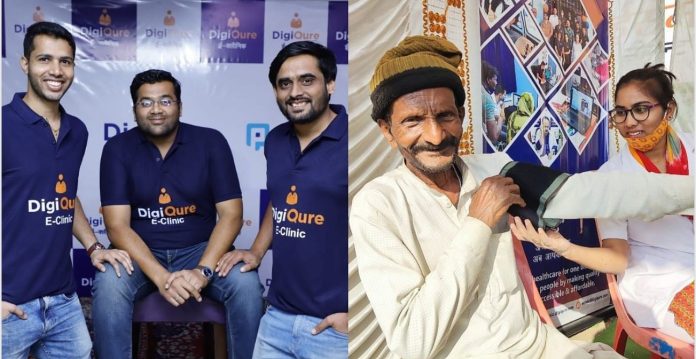
Despite advancements in the medical field, rural India continues to face challenges in accessing adequate healthcare services. However, a promising startup called DigiQure aims to change this narrative. Recently featured on Shark Tank India Season 2, DigiQure has garnered attention for its innovative approach to addressing healthcare gaps in rural areas.
Founded in 2020 by three graduates from the National Institute of Technology, Bhopal, DigiQure is a healthcare startup based in Bhopal. The company establishes telemedicine-based e-clinics, where trained healthcare workers known as “caregivers” facilitate video consultations between patients and specialist doctors. In addition, DigiQure offers digital prescriptions, medicines, lab test services, and necessary referrals to partner hospitals for secondary care.
During the show, Akanksh Tandon, one of the founders, presented DigiQure and received multiple offers from the sharks. Anupam Mittal, founder of Shaadi.com, emphasized the need for a non-traditional approach to healthcare in order to bring about real change.
Also Read: Specially-Abled Inspiration-Prasanna Kumar’s Solo Bike Ride from Kanyakumari to Kashmir

Tandon’s motivation to establish DigiQure stems from a childhood tragedy he witnessed while growing up in a village in Bhopal. He observed how individuals from rural areas lost their lives to preventable healthcare conditions, such as diarrhea, when access to treatment was limited due to financial constraints. This incident left a lasting impact on Tandon, spurring him to make a positive difference in the lives of millions.
To pursue his vision, Tandon teamed up with his NIT-Bhopal batchmates, Saket Asati and Ankur Chourasia, and founded DigiQure. All three founders made a bold decision to leave their jobs, fully committing themselves to solving the pressing healthcare challenges faced by rural communities. They firmly believed that this endeavor required their undivided attention and could not be pursued as a mere side project.
Apart from offering consultations, lab services, and medicines, DigiQure introduced a subscription-based Saksham card, which costs just ₹1 per day. Cardholders can avail free consultations at e-clinics, a valuable service that enhances accessibility to healthcare in remote areas. Since its launch in January 2022, the Saksham card has gained 1,800 subscriptions.
Currently, DigiQure operates ten e-clinics in Madhya Pradesh, Uttar Pradesh, and Bihar, with plans to expand into the northeastern state of Mizoram. Notably, the company does not charge commissions from partner hospitals for consultations. Instead, it offers marketing services and organizes medical camps, charging hospitals between ₹1.5 lakh and ₹2 lakh.
Between January and September 2022, DigiQure generated a revenue of ₹12.2 lakh. One of their outlets achieved monthly sales of ₹80,000, showcasing the startup’s growth potential. Additionally, the founders run a tech company called IOTA Informatics, which played a crucial role in developing DigiQure’s platform. IOTA also undertakes tech-based projects for other companies. Furthermore, DigiQure has formed alliances with two other healthcare startups, AyuSynk and Spandan, which also appeared on Shark Tank India.
Also Read: UPSC Toppers Ishita Kishore and Garima Lohia’s Inspiring Journeys

During the show, Aman Gupta, co-founder of boAt, expressed admiration for DigiQure’s vision but decided not to invest, considering it a noble cause rather than an investable business. However, Vineeta Singh, co-founder of Sugar Cosmetics, and Namita Thapar, executive director of Emcure Pharmaceuticals, made a joint offer of ₹40 lakh for 20% equity, valuing the company at ₹2 crore. Their offer came with the condition that IOTA and DigiQure merge into a single entity.
Peyush Bansal, co-founder of Lenskart.com, also made an offer of ₹1 crore for 25% equity, valuing DigiQure at ₹4 crore. Similar to Singh and Thapar, Bansal proposed merging IOTA and DigiQure. In response, Thapar revised their offer to ₹40 lakh for 15% equity. Bansal argued that the disruption DigiQure aimed to bring did not require healthcare expertise but rather a technological and non-linear approach.
Another shark, Anupam Mittal, made an offer with multiple conditions. He suggested merging the two companies, changing the business name to Geeta (inspired by the name of the deceased child), and refraining from increasing the number of clinics until the product was market-ready. In exchange, Mittal offered ₹1 crore for 10% equity, valuing DigiQure at ₹10 crore. Tandon proposed that Thapar join in for 10% equity instead, leading to Singh withdrawing from the deal. Ultimately, the deal was finalized with Thapar investing ₹40 lakh for 10% equity, valuing DigiQure at ₹4 crore.
Although Mittal and Bansal believed that the decision to merge DigiQure with a medical firm was a mistake, potentially hindering the startup’s disruptive potential, the founders stood by their choice.
DigiQure’s appearance on Shark Tank India showcased its innovative approach to rural healthcare and its commitment to making a significant impact on the lives of underserved communities. With its telemedicine-based e-clinics and comprehensive range of services, DigiQure is poised to reshape the landscape of healthcare accessibility in rural India.
